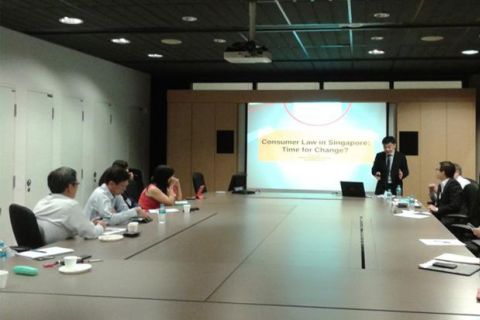
Minority investors need to be protected through better information and corporate governance, says SMU Associate Professor Wang Jiwei.

Photo Credit: Cyril Ng
By David Turner
SMU Office of Research – Systematic analysis of company transactions is giving minority investors more clues about whether the controlling owners of listed companies are likely to further grow their wealth or expropriate it.
Understanding how minority investors fair in companies dominated by majority shareholders is the central research interest of Wang Jiwei, Associate Professor of Accounting (Practice) at the Singapore Management University (SMU) School of Accountancy. His research also aims to protect minority investors through better information and corporate governance.
But protecting minority shareholders is a challenge in Asia where, instead of the balancing force of diffuse shareholdings, many companies are controlled by a dominant shareholder. “Having a dominant shareholder puts the parent company in a powerful position. The parent can use its voting power to make decisions that benefit the parent but not the minority investors,” Professor Wang explains.
Loans by subsidiaries to their parent company
The most ubiquitous illustration of this power, and the most troubling to investors, is something known as related party transaction, which refers to a trade or loan between parent and subsidiary. Because related party transactions are voluminous, varied and legitimate, it is hard for outsiders to know whether the transactions are malignant or benign.
In fact, it was hearing the concerns of market participants that motivated Professor Wang to research this area. “Institutional investors and auditors had raised concerns about transactions between parent companies and their subsidiaries,” he notes. “But all this was anecdotal, and so the question for us was whether we could look at it systematically and bring rigour to the problem analysis.”
Professor Wang began to study the available information about companies listed in China, a key market characterised by dominant shareholders. His findings were troubling: Between 1998 and 2001, he found high levels of related party transactions around the time of initial public offerings (IPO) on the Shanghai Stock Exchange. This inferred that parent companies had transacted with their subsidiaries to boost their performance and enhance their attractiveness ahead of the IPO.
The sting for shareholders would come later, reveals Professor Wang. “Most interesting was what was happening after the IPO. The parent company would expect something in return, such as a loan from the cash raised by the IPO. After providing the loan, the newly listed companies then found it challenging to get the loan back, and this ultimately harmed minority investors.” China’s securities regulator subsequently banned subsidiary to parent company loans in 2006.
Unfair barter trade
With the aim of systematically identifying and assessing risks associated with related party transactions, Professor Wang turned the spotlight on barter trading. Barter trading presents two risks for minority investors: the parent company could exchange less profitable assets for more profitable assets, or they might do the reverse – give more profitable assets to the listed company to artificially boost its operating performance. “The problem here is how to assess whether oranges are being fairly traded for apples,” says Professor Wang.
Together with colleagues from universities in China, Professor Wang formulated a model to compare the quality of assets that the parent company and subsidiary exchanged. They applied this model to a sample of 305 assets exchanges by 229 listed companies on the Shanghai Stock Exchange and the Shenzhen Stock Exchange. The findings gave some important clues: listed firms that had not been fully restructured out of the parent and were in sound financial condition had exchanged more profitable assets for less profitable assets during the post-IPO period.
Developing a ‘red flag’ list
To safeguard the interests of minority shareholders, Professor Wang is developing an index of common features to watch out for – sort of a ‘red flag’ list. “Investors and auditors are increasingly turning to big data to help them analyse large and difficult portfolios. Understanding the common features of companies that enter into harmful related party transactions will help all manage the risk and identify what factors to pay attention to,” he describes.
Moving forward, Professor Wang wants to contribute to better protection that solve problems arising from the root causes. The media’s ability to promote better governance is one preventative area that he has explored.
In his study of media coverage and valuations of 366 listed family firms in China from 2003 to 2006, Professor Wang found that media coverage of controlling shareholders helped to bridge the information asymmetry for investors. Neutral media reports about controlling parent companies lead to higher valuation for their listed subsidiaries, while negative media reports lead to lower valuation. Interestingly, shareholders appeared to disregard positive media reports, perhaps suspecting the media of bias.
Professor Wang has seen improvements during the course of his research into this area, such as China’s ban on loans between listed subsidiaries and their parent companies. He believes that systematic research and media scrutiny will provide some protection to minority shareholders.
But one cannot dissect an entire industry on his own. Partnering with practitioners is important to this endeavour, Professor Wang adds, especially since companies’ financial disclosures and annual reports give away little about their related party transactions. “We look at the public disclosures, then talk to the industry, such as investors and auditors, to understand what they think about the information and what they do in practice. With this insight, we look at the public information again,” he says.
See More News
Want to see more of SMU Research?
Sign up for Research@SMU e-newslettter to know more about our research and research-related events!
If you would like to remove yourself from all our mailing list, please visit https://eservices.smu.edu.sg/internet/DNC/Default.aspx

